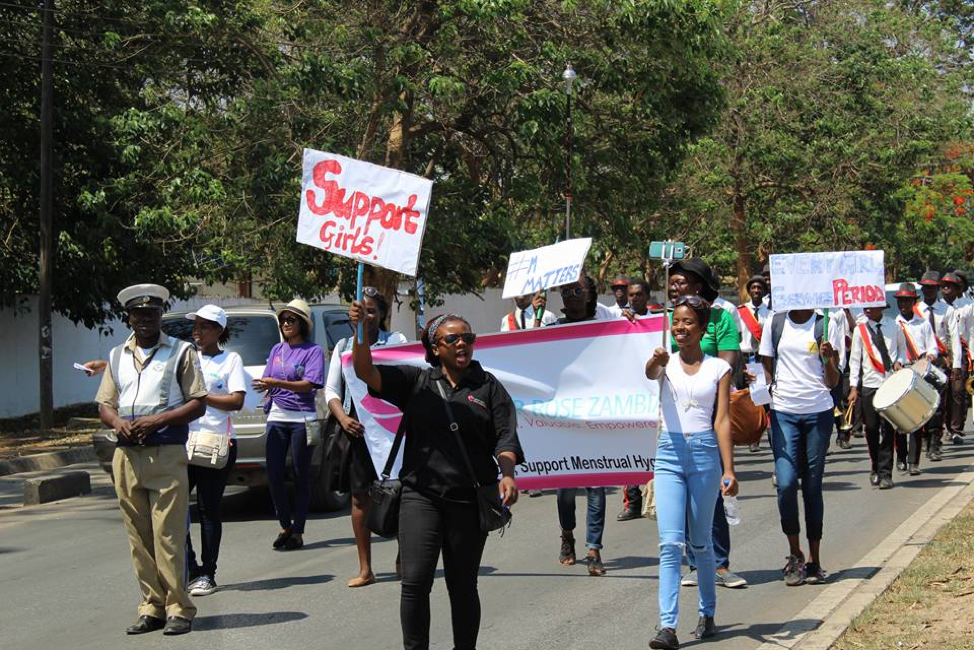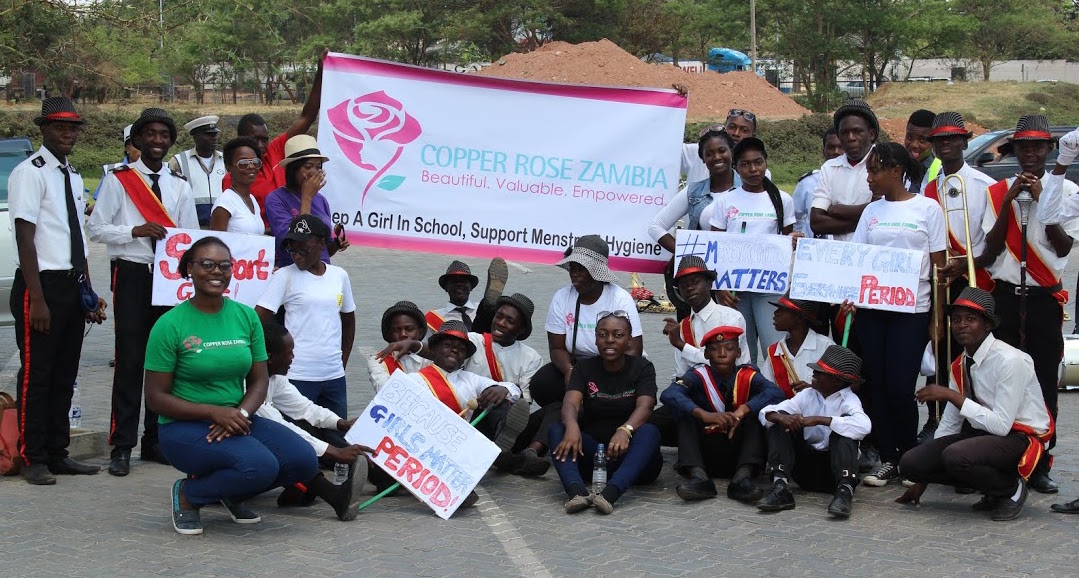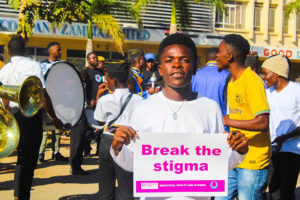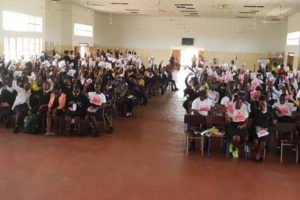Money makes a huge difference in the life of a young feminist group. Because with more resources, young feminist groups have been able to amplify their organizing around some of the most pressing issues that we face in the world today. And money is also one of the key things that young feminist groups lack. In fact, FRIDA | The Young Feminist Fund was born out of a funding gap felt by young feminist organizing worldwide.
Hence, mobilizing resources is one of the key things that we learn, as young feminist groups, to help us get better at visiblising our work and make our activism more sustainable. One of our grantee partners from sub Saharan Africa region, Copper Rose Zambia, was recently engaged in a fundraising walk in the city of Lusaka. CRZ is a young feminist group that describes itself as “delicate and beautiful as a rose and as essential and precious as copper is to Zambia’s economy.” Among many other things, the group works with young girls and ensuring their good menstrual health to help them advance their education without any hindrance.

Marching in the city for over 3 hours to raise awareness on menstrual health and hygiene, while also engaging in raising funds for their initiatives, Copper Rose Zambia’s walk was quite a learning experience. Keep a girl in School, Support Menstrual Hygiene was their slogan. We got in touch with Faith, one of the co-founders, of CRZ to learn more about this memorable experience. Below are excerpts:
Can you tell us a bit more about the idea behind “Fundraising Walk”? How did you come up with it?
A fundraising walk is a walkathon in which participants raise money by collecting donations or pledges for walking a predetermined distance or course. The idea behind it is to raise money from motorists and/or roads users for a specific cause. As Copper Rose, we wanted to increase our fundraising activities in the most cost effective way as well as raise awareness on Menstrual Health. This idea of hosting a Fundraising walk was the best option and we believed we would be able to not only mobilise funds but stir up talk about Menstrual Hygiene as a taboo topic.
How did you prepare for it? We are curious about how much work went into it so that other groups can learn from your experience!
In May 2016, the Copper Rose Management Team decided to divide the volunteers into 3 working groups. These working groups include; Fundraising & Resource Mobilization, Technical Development and the Public Relations working groups. This was to help increase their participation as well as aid in effective execution of tasks in line with our organisational objectives and mission. To date, this has been working well for us. The working group responsible for planning and preparing for the Fundraising Walk was the Fundraising and Resource Mobilisation working group. They came up with the idea and generated a map for sharing responsibilities amongst everyone. Every member of the working group worked tirelessly through their task to see to it that this event was a success. From printing the banner and flyers to collecting a police permit, speaking to the media, as well as getting refreshments, they all managed to work as a team and team work surely does get the job done!

How much support were you able to mobilize? Were any new community partnerships and allyships born out of this public action? Do you feel it was a success?
We received great support from our partners like WaterAid and ActionAid who had some representatives come along for the walk with us. We also welcomed our individual donors and well-wishers who were excited and hyped up by this great cause. Our target was to raise $500 but we were only able to raise $200. We didn’t reach our financial target but we still feel it was a success because we were able to reach our visibility target as an organisation, and also improved awareness on menstrual hygiene. Since then, many reporters have come to interview us on menstrual hygiene management, and just recently, a Television company approached us to feature in a documentary about menstrual hygiene management. In addition, organisations like The Rotary Club are willing to partner and support two of our workshops this year. So we can only look forward and hope for the best.
What is the giving culture like in your community? What opportunities, beliefs, challenges are there around donating and supporting groups like yours?
Zambia has a positive giving culture when it comes to organising social events like marital gatherings, celebrations etc. However, this is not the case for issues affecting welfare like menstrual hygiene. People have a misconception that NGOs easily receive international funding, and funding and support from the government and therefore do not feel obligated to support such causes. They also feel that their support would be a drop in the ocean and this usually prevents them from giving. Despite these opinions, we were able to raise $200 (from our initial $500 target), which will go towards 1 of the 2 pad sewing sessions we intend to host. Regardless of the fact that we did not meet the target, the amount is still sufficient to start the training.
Two of your slogans were “Menstruation Matters” and “Girls Matter Period”. Can you please tell us more about in what ways the lack of pads and other health needs of girls and young women pose problems for their access to education and other services?
Menstruation Matters started as a hashtag on social media and was adopted by many organisations that work in menstrual hygiene management to show that Menstruation Matters Everywhere. Menstruation is not only about Women but about Men and their involvement because it affects them too. Through their wives, daughters, mothers, sisters and even girlfriends, they need to care about them by playing the role of ensuring that they support menstrual hygiene.
The slogan ‘Girls Matter Period’ shows how multifactorial the lack of menstrual hygiene management is. It represents how periods affect girls, especially their education. Statistics show that girls miss 2-3 days of school each month because of their period. Most of them do so due to the lack of basic sanitary materials. They are unable to fully and confidently participate in class because of being afraid of accidentally messing themselves up and hence decide not to go to school at all. Their absence from school in the long run affects their academic performance and therefore, we use this slogan because we want to bring these facts to people’s attention.
Share with us some of your current plans. What continues to be a challenge and how can people best support you?
Our biggest challenge is transportation of volunteers to our project sites which are in the remote parts of the country! It is very difficult to transport volunteers from one point to the other. We use public transport which often does not take us to our final destination. We usually find ourselves walking very far distances. We would love for support to help us acquire a good means of transportation. Another challenge we face would be capacity; if we could have the means to be trained on how to strengthen our advocacy, we would be able to conduct more activities like the walk we had.
In line with our new plans, we hope to engage in maternal and child health projects and are working on it.
All pictures are © Copper Rose Zambia. To learn more about them, visit their Facebook page. They are also on Instagram as @copperrosezambia

